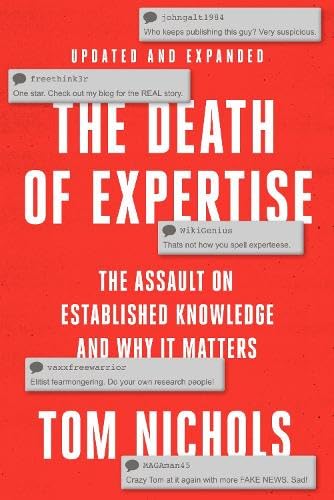
The Death of Expertise: The Campaign Against Established Knowledge and Why It Matters
Thomas M. Nichols, Tom Nichols
Publisher
Oxford University Press
Publication Date
4/3/2024
ISBN
9780197763827
Pages
334
Categories
About the Author

Thomas M. Nichols
Questions & Answers
The primary reasons for the decline in trust and respect for experts include:
- Digital Revolution and Social Media: The internet and social media have facilitated the spread of misinformation and the cult of ignorance, making it easier for individuals to dismiss expert knowledge.
- Higher Education: The shift towards treating education as client service and the erosion of respect for authority in higher education have contributed to a lack of deference to experts.
- 24/7 News Cycle: The constant flow of information and the emphasis on entertainment over factual accuracy in media have led to misinformed public opinion.
- Misconceptions of Equality: The illusion of egalitarianism created by social media and the belief that everyone is equally intelligent or informed has undermined respect for expertise.
- Lack of Understanding of Government: Many citizens lack an understanding of their own government and its functioning, leading to distrust of experts and elected officials.
The internet and social media have significantly contributed to the decline of expertise by fostering a culture of misinformation and undermining the credibility of experts. The vast amount of information available online, much of it unverified, leads to confusion and a misperception of knowledge. This abundance of information, often presented without context, can make individuals feel they possess expertise simply by searching online, thus diminishing the value of professional knowledge.
Social media exacerbates this issue by creating echo chambers where users are more likely to encounter information that confirms their pre-existing beliefs, rather than challenging them. This reinforcement of biases leads to a lack of critical thinking and an increased resistance to expert opinions. Additionally, the immediacy and informal nature of social media communication can lead to a lack of respect for experts and their expertise, as interactions become more about personal validation than factual accuracy.
The education system plays a significant role in the decline of expertise. Firstly, grade inflation and the overemphasis on attendance and customer service rather than rigorous learning contribute to students graduating without a true understanding of their subjects. This leads to a workforce that lacks critical thinking and respect for expertise. Secondly, the rise of "helicopter parenting" and the culture of entitlement among students undermine the teacher-student dynamic, further diminishing the value of expertise. Lastly, the shift from traditional education to online learning, which often lacks the structure and guidance necessary for deep learning, exacerbates the problem. These factors collectively weaken the foundation of expertise and critical thinking in society.
The anti-intellectualism trend significantly impacts democracy and public discourse by fostering distrust in expertise and established knowledge. This skepticism leads to a breakdown in the relationship between experts and citizens, undermining the democratic process. In public discourse, the trend promotes a culture where every opinion is considered equally valid, regardless of factual basis or expertise. This diminishes the value of evidence-based discussions and rational analysis, leading to polarized debates and a decline in the quality of public policy. Additionally, the trend encourages a narcissistic belief in personal superiority, where individuals dismiss expert advice and facts that contradict their beliefs, further eroding the foundation of informed democracy.
To restore trust in experts and foster informed decision-making, several measures can be taken:
- Enhance Education: Promote critical thinking and media literacy in schools to help citizens discern credible information from misinformation.
- Transparent Communication: Experts should communicate complex issues clearly and avoid jargon, making their advice accessible to the public.
- Accountability: Establish mechanisms for holding experts accountable for their advice, including peer review and transparency in their methodologies.
- Diverse Representation: Ensure that expert panels and advisory groups are diverse, reflecting a range of perspectives and experiences.
- Media Responsibility: Encourage journalists to fact-check and verify information, and to avoid sensationalism that can undermine trust in experts.
- Public Engagement: Encourage public dialogue on complex issues, allowing experts to present their views and citizens to voice their concerns.
- Policy Support: Governments should support policies that promote evidence-based decision-making and invest in research and development.
- Digital Literacy: Educate the public on the risks of misinformation online and how to critically evaluate online sources.
By implementing these strategies, trust in experts can be rebuilt, and a culture of informed decision-making can be fostered.